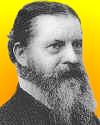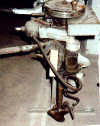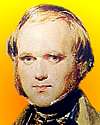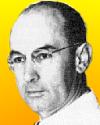 | TODAY IN SCIENCE HISTORY NEWSLETTER - 19 APRIL |
| Feature for Today |
 On 19 Apr 1892, the first Duryea automobile was operated by pioneer manufacturer Charles E. Duryea. This would become the model for the first automobile regularly made for sale in the U.S. On 19 Apr 1892, the first Duryea automobile was operated by pioneer manufacturer Charles E. Duryea. This would become the model for the first automobile regularly made for sale in the U.S.In 1915, Charles Duryea published The Automobile Book: a Practical Treatise on the Construction, Operation and Care of Motor Cars Propelled by Gasoline Engines. You can read his short review of the history of the automobile up to that time in his first chapter, Anticipations of the Motor Car. You may be wryly interested in his concluding remarks about electric vehicles. In the third chapter, he writes about Practical Points on Motor Cars, and therein you may begin to appreciate exactly what it meant for the eager new owner of a 1915 automobile to become "acquainted with it." If taking delivery on a 1915 car, mark Duryea's advice to a new owner to avoid spectators "quite willing to enjoy to the fullest any amusement which they could derive from his lack of experience. Under such conditions, few men can retain their self-control and reasoning faculties to the fullest..." As for testing the fuel mixture: "This can be tested by removing a spark plug, and holding a lighted taper, or match, well down in the hole... In making this test, be sure to keep the face and fingers out of the way of the flame, which will extend a foot or two, and is so hot, that it is liable to burn one's fingers badly, and singe one's face and hair." |
| Book of the Day | |
| |
| Quotations for Today | |
 | "People must understand that science is inherently neither a potential for good nor for evil. It is a potential to be harnessed by man to do his bidding." |
 | "Another characteristic of mathematical thought is that it can have no success where it cannot generalize." |
 | "It can even be thought that radium could become very dangerous in criminal hands, and here the question can be raised whether mankind benefits from knowing the secrets of Nature, whether it is ready to profit from it or whether this knowledge will not be harmful for it. The example of the discoveries of Nobel is characteristic, as powerful explosives have enabled man to do wonderful work. They are also a terrible means of destruction in the hands of great criminals who lead the peoples towards war. I am one of those who believe with Nobel that mankind will derive more good than harm from the new discoveries." |
| QUIZ | |
| Before you look at today's web page, see if you can answer some of these questions about the events that happened on this day. Some of the names are very familiar. Others will likely stump you. Tickle your curiosity with these questions, then check your answers on today's web page. | |
| Births | |
 |  Glenn T. Seaborg, born 19 Apr 1912, was an American nuclear chemist. During 1940-58, Seaborg and his colleagues at the University of California, Berkeley, produced nine of the transuranic elements (plutonium to nobelium) by bombarding uranium and other elements with nuclei in a cyclotron. Glenn T. Seaborg, born 19 Apr 1912, was an American nuclear chemist. During 1940-58, Seaborg and his colleagues at the University of California, Berkeley, produced nine of the transuranic elements (plutonium to nobelium) by bombarding uranium and other elements with nuclei in a cyclotron. |
 |  Ole Evinrude, born 19 Apr 1877, was inventor and manufacturer of the outboard marine engine. He patented his first in 1910. It quickly replaced steam and foot-driven motors for boats and spurs a new industry. The result was the Evinrude Outboard Motor that remains popular to this day. Ole Evinrude, born 19 Apr 1877, was inventor and manufacturer of the outboard marine engine. He patented his first in 1910. It quickly replaced steam and foot-driven motors for boats and spurs a new industry. The result was the Evinrude Outboard Motor that remains popular to this day. What was Evinrude's nationality? What was Evinrude's nationality? |
| Deaths | |
 |  A French physical chemist (1859-1906) was a cowinner of the Nobel Prize for Physics in 1903. His studies of radioactive substances were made despite conditions of much hardship and barely adequate laboratory facilities. A French physical chemist (1859-1906) was a cowinner of the Nobel Prize for Physics in 1903. His studies of radioactive substances were made despite conditions of much hardship and barely adequate laboratory facilities. |
 |  Charles Robert Darwin (1809-1882) was an English naturalist renowned for his documentation of evolution and for his theory of its operation, known as Darwinism. His evolutionary theories, which he propounded chiefly in two works - The Origin of Species (1859) and Descent of Man. Charles Robert Darwin (1809-1882) was an English naturalist renowned for his documentation of evolution and for his theory of its operation, known as Darwinism. His evolutionary theories, which he propounded chiefly in two works - The Origin of Species (1859) and Descent of Man. |
| Events | |
 |  On 19 Apr of a certain year, Albert Hoffman chose to deliberately ingest 250 micrograms of the Lysergic Acid Diethylamide (LSD) he had synthesized at the Sandoz Laboratories in Basel, Switzerland. Three days earlier he had accidentally absorbed some through his skin by touching a container of the drug. From the accidental exposure he experienced restlessness, dizziness and hallucinations: "extreme activity of imagination." On 19 Apr of a certain year, Albert Hoffman chose to deliberately ingest 250 micrograms of the Lysergic Acid Diethylamide (LSD) he had synthesized at the Sandoz Laboratories in Basel, Switzerland. Three days earlier he had accidentally absorbed some through his skin by touching a container of the drug. From the accidental exposure he experienced restlessness, dizziness and hallucinations: "extreme activity of imagination."  In which decade did Hoffman first deliberately experience the effect of the drug LSD? In which decade did Hoffman first deliberately experience the effect of the drug LSD? |
| Answers |
When you have your answers ready to all the questions above, you'll find all the information to check them, and more, on the April 19 web page of Today in Science History. Or, try this link first for just the brief answers. Fast answers for the previous newsletter for April 18: gallium; photoelectricity; diode; the airplane was a jet, making the first U.S. jet passenger international trip. |
| Feedback |
 If you enjoy this newsletter, the website, or wish to offer encouragement or ideas, please send feedback by using your mail reader Reply button. If you enjoy this newsletter, the website, or wish to offer encouragement or ideas, please send feedback by using your mail reader Reply button. |
--
If you do not want to receive any more newsletters, this link
To update your preferences and to unsubscribe visit this link
If you do not want to receive any more newsletters, this link
To update your preferences and to unsubscribe visit this link
! !



Δεν υπάρχουν σχόλια:
Δημοσίευση σχολίου